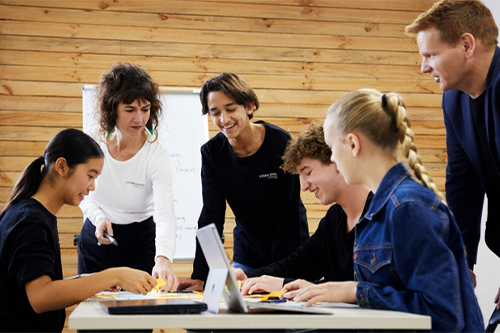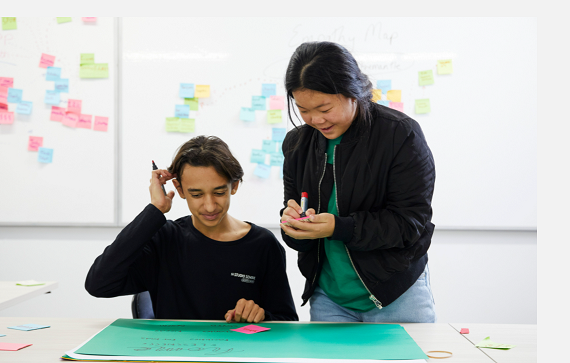
Next year, a cohort of Fremantle students will be the first to a revolutionary new educational model being dubbed “an exciting alternative to mainstream schooling”.
And with no bell, classroom, timetable or set study times, this unconventional approach to education promises to shake things up.
All Saints’ College, through its Djoowak, The Beyond Boundaries Institute, has been developing a range of innovative programs, alongside and in partnership with educational innovators such as Professor Yong Zhao, Jan Owen AM and others in business, industry and higher education who form the College’s Beyond Boundaries Advisory Group.
An exciting extension of this work is The Studio School (TSS), which will allow see Year 10-12 students combine their studies with authentic and purposeful projects in partnership with industry mentors whilst also achieving their final school certificate and ATAR.
This personalised “studio” model of education will see students combine their studies with authentic and purposeful projects in partnership with industry mentors – but at a pace, and at a time, of their own choosing.
‘Rather than being kept out of the school buildings, the community is invited in’
Esther Hill is the Director of Djoowak: The Beyond Boundaries Institute and Dean of Teaching and Learning, at All Saints’ College, said TSS builds on the key notions of personalising learning and connecting students with the ‘real world’ through authentic learning opportunities.
“TSS draws on the wisdom and experience of the studio model in its various iterations - from High Tech High to NuVu and to the Studio School movement in the UK - and develops this model in the specific context of Western Australia and its relatively rigidly structured senior secondary curriculum,” Hill told The Educator.
“At its heart, the experience of being a student or a learning mentor at TSS feels very different from the traditional model of school. Imagine a co-working space for students, learning mentors and facilitators. Rather than having break-out spaces in the open plan, flexible spaces, you have break-in spaces where, at point of need, lessons can be conducted or meetings can be had”.
The school occupies a seat in the heart of the vibrant, eclectic CBD of the port city of Fremantle. Rather than being removed from the daily life of the city, Hill describes the school as being a part of it, with TSS students connecting and working with local business, industry and the people of Fremantle and its surrounds.
“Rather than being kept out of the school buildings, the community is invited in,” Hill said.
“During the day, and supported by the learning mentors at TSS, students map their learning goals, tasks and outcomes - they might be completing online courses, powered by All Saints’ College, working collaboratively with peers on their curriculum, attending a maths class, meeting with their project mentors, conducting meetings or working offsite, pursuing their projects or a course that supports their learning”.
Challenging the boundaries in education
Hill said the Beyond Boundaries Institute works to “challenge the artificial and imposed boundaries” that tend to exist in the traditional schooling model.
“These boundaries include those between school and the ‘real world’; between the often siloed domains of traditional curriculum and learning; between senior secondary and tertiary education and the workplace; between a focus on skills and knowledge and the development of capabilities; and between the needs of a system and the needs of the individual student,” she said.
“The benefits of the TSS educational experience speak to the stepping beyond these boundaries that can occur when we reimagine, within the constraints of the system, what an education can be, and what we value”.
For both staff and students, Hill said the benefits speak to powerful, individualised bespoke programs; engagement with, and honouring of, the talents and interests of our young people, and allowing those to be the focus; student voice and agency; and connection with the ‘real world’ and real opportunities: citizens of the here-and-now, rather than being “citizens in waiting”.

Helping students navigate the VUCA world
Peter Allen, vice principal at All Saints’ College, said TSS is underpinned by significant research and reports, both globally and within Australia, that outline the gaps that exist in what schools are providing students, particularly at the senior secondary level.
“Alongside this, the work of The Foundation for Young Australians, Learning Creates Australia as well as the University of Melbourne’s significant work on the New Metrics for Success is supplemented by our grounded research and work with business, industry and the tertiary sector,” Allen told The Educator.
“All of this research and data suggests that we need to do more work in developing the broad set of capabilities that will enable our young people to thrive in the VUCA [volatile, uncertain, complex and ambiguous] world in which we live”.
Allen said there is also a need for stronger connections between young people’s experience in senior secondary schooling and the world of work and further study, providing multiple flexible pathways.
“Further, our young people need to be equipped with a new set of enterprise skills that will see them be active creators of new value that can impact their world and the worlds of their communities,” he said.
Allen said an important benefit of TSS is the mentoring that students receive.
He said whilst the regular curriculum is facilitated by teachers, online platforms and peer to peer learning, the focal point of each students’ learning program is the projects, experiences and qualifications that they engage in.
“With students paired with mentors in business, industry, social enterprise, community and so on, their learning is in the real world and from people with relevant skills and connections, rather than the decontextualised classrooms in a traditional high school environment - learning on the job, learning in flow, learning connected to experts,” Allen explained.
“A student who has a passion and interest in fashion, for example, might be paired with industry mentors in both business and enterprise, and in the work of designing garments with and for clients”.
Allen said it is important to draw a distinction here between students engaging in ‘work experience’ and students engaging, supported by mentors, in projects.
“Our mentoring partners would be seeking to tap into the skills and ideas of the student and would be finding meaningful, authentic projects that provide reciprocal value to both the student and the partner”.
‘Significant transformational challenges’
Allen said The Studio School’s model offers four significant transformational challenges to the current model of traditional education: where students learn; what students learn; who students learn from; and the ways in which success is measured.
“This model transforms our ideas about where students learn, with the traditional hallways and classrooms replaced with a flexible ‘real world’ connected coworking space,” he said.
“Rather than a one-size fits all model, TSS challenges education to be personalised, bespoke and deeply responsive to the individual student”.
Allen said shifting the understanding of who students learn from, education is connected to experts, business and industry in authentic ways with students learning from those experts, from each other and from the multiple platforms available to them both online and face to face.
“With the decline in the currency of ATAR as the sole means of measuring young people’s capacity to move beyond their senior secondary years, this model is transformational in the ways in which we measure success,” he said.
“Firstly, those real world experiences and outcomes are themselves a measure of success – a real and authentic one and, secondly; success is measured through the growth and development of those broader capabilities of collaboration, organisation, critical and creative thinking within the context of the authentic and valued projects they undertake”.


